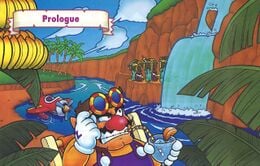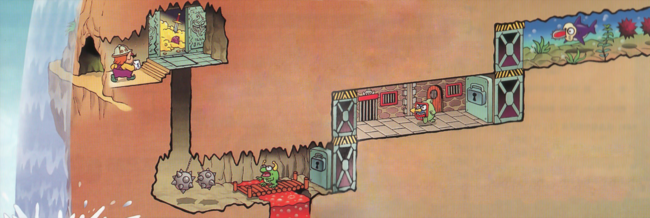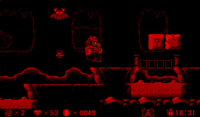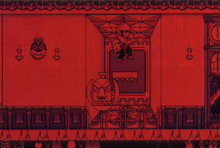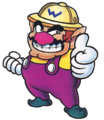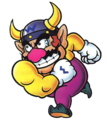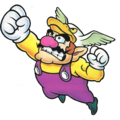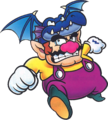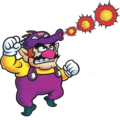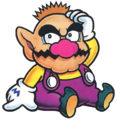Virtual Boy Wario Land: Difference between revisions
m (→Gameplay) |
No edit summary |
||
| Line 307: | Line 307: | ||
|} | |} | ||
{{br}} | {{br}} | ||
==Pre-release and unused content== | |||
[[File:VBWL S10 prerelease.png|thumb|220px|An early [[Stage 10 (Virtual Boy Wario Land)|Stage 10]] with an unfinished [[Blade-Face]] enemy, simply consisting of an unshaded outline.]] | |||
{{main|List of Virtual Boy Wario Land pre-release and unused content}} | |||
''Virtual Boy Wario Land'' was first revealed at {{wp|E3 1995}} under the title '''''Wario Cruise'''''. Gameplay demos showed it having unfinished animations, and the elevators at the end of the level originally didn't require a key.<ref>P, Anthony (January 30, 2017). [https://www.youtube.com/watch?v=Op5EkC7GbxQ&t=9294s E3 1995]. ''YouTube''. Retrieved May 3, 2022.</ref> Magazines in the months prior to release have published screenshots showing alternate level designs and unfinished enemies. | |||
The original ''Wario Cruise'' title appeared on the Virtual Boy's system packaging as an upcoming games promotion, and the title continued to be used in official media up to a month before the game's November 1995 release.<ref>Nintendo Power volume #77, October 1995, pg 105</ref> Product catalogues have also used the tentative title '''''Wario's Treasure Hunt''''' with a prototype box art.<ref>Electronic Gaming Monthly issue #76, November 1995, pg 182</ref> | |||
==Staff== | ==Staff== | ||
Revision as of 18:18, October 13, 2022
| Virtual Boy Wario Land | |||
|---|---|---|---|
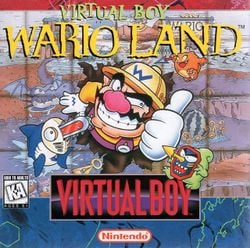 For alternate box art, see the game's gallery. | |||
| Developer | Nintendo R&D1 | ||
| Publisher | Nintendo | ||
| Platform(s) | Virtual Boy | ||
| Release date | Template:Release[?] | ||
| Genre | Platformer | ||
| Rating(s) |
| ||
| Mode(s) | Single player | ||
| Input | Virtual Boy:
| ||
Virtual Boy Wario Land (also shortened as Wario Land), originally titled Wario Cruise[1], is a video game released by Nintendo for the Virtual Boy in 1995. It is the second installment in the Wario Land series, and the follow-up to Wario Land: Super Mario Land 3. It is a side-scrolling platformer that shares several elements from its predecessor, such as hat-based power-ups and collectable treasure which can affect the game's ending. The game also incorporates several new elements that use the Virtual Boy's technology, such as the ability to jump between background and foreground areas, and enemies and obstacles which do the same. The game was well-received on release, and is generally considered by critics to be one of the Virtual Boy's better titles.
Story
I, Wario, have an interesting story to tell. One day during my vacation in the Awazon river basin, I landed my trusty seaplane, Bulldog, and decide to relax in the shadow of the beautiful Aldegara Waterfall. While basking in the sun, I spied some strange creatures with masks entering the waterfall. This piqued my interest!
I hurried over and followed them into the waterfall. Behind the falls there was a large cave, and in the back of the cave ... there was a vault filled with a glorious mountain of treasure!!
Some of the masked creatures jumped me, but I quickly overcame them. "This treasure is all mine now!", I though to myself and rushed in to collect the loot. Suddenly, the floor collapsed and I fell!
I found myself deep within the Earth! I was quite angry and vowed revenge on these creatures, "I will get their treasure!!!"– Story from the instruction booklet
After progressing through the game's thirteen stages including three boss stages, Wario faces the final boss Demon Head, a large genie which uses its claws and flames to attack. After defeating Demon Head, the ending the player receives depends on what the player collected during the game, how long it took them to complete the title, and the difficulty they played on.
If Wario did not obtain all ten of the stages' treasures, he will sigh with disappointment and leave the cavern with the coins he did acquire. He heads back to his plane, only to find that a family of beavers have vandalized it and leaving Wario stranded in the jungle. Wario chases and grabs one of the beavers, but before he could punish it, the beaver offers an alternative way of flying in exchange for all the coins he found in the cavern. Wario reluctantly agrees and takes his leave while the beaver takes the cash. The ending the player receives under these circumstances varies on the total amount of coins that they collected by the end of the game.
| Description | |
|---|---|
| < 5000 coins | Wario flies home by flapping two fans with his own arms, tiring him out. |
| ≥ 5000 coins < 20 000 coins | Wario is given a bike attached to a miniature blimp that he pedals home. |
| ≥ 20 000 coins < 50 000 coins | Wario is given a dragon-like creature which he rides home alongside its children. |
| ≥ 50 000 coins | Wario is given a new plane which he rides atop of and pilots with a remote control. |
If all ten treasures were collected, Wario will open the vault, receiving a heavy amount of coins along with a magic carpet which flies him home and a magic bottle. Under these circumstances, the ending differs based on the amount of time it took for the player to complete the game, and the difficult in which it was completed. The amount of coins collected have no impact on these endings.
| Description | |
|---|---|
| Complete on the normal difficulty, with over two hours of playtime | Wario will fly home on the magic carpet with the treasure and the bottle in tow. |
| Complete on the normal difficulty, with less than two hours of playtime | Similar to the previous ending, however Wario will be accompanied by a woman in a bunny suit sitting alongside him on the magic carpet as they fly home with fireworks in the background. |
| Complete on the hard difficulty, with more than two hours of playtime | Similar to the first ending, however Demon Head will appear from the bottle and row him back home on the magic carpet. A congratulatory message will be displayed saying "You are a master gamer! You rock!!" |
| Complete on hard difficulty, with less than two hours of playtime | The second ending will play without Demon Head, with the congratulatory message at the end. |
Gameplay
During the game, the player must traverse through fourteen stages, including four boss stages, in order to complete the game. Elevators connect the stages in a linear order - the game's world is continuous, without a stage select, and so the player can only return to previous stages by physically backtracking to them. In order to unlock the elevator at the end of each stage, the player must find a gate key hidden in each stage. In between stages, the player can use coins obtained in the past level in order to play two different minigame, to win either more coins or more hearts. Afterwards, the remaining coins earned are added to the total coins count, and the game is saved.
Out of the game's fourteen stages, four are boss levels and ten are platforming stages. In the platforming stages, the player explores the environment, collecting coins and hearts in order to reach the next elevator. Coins can be used to play minigames, and otherwise affect the ending the player receives without collecting all ten treasures. Hearts give players an extra life if a hundred are collected. Both hearts and coins can be collected in big and small variants, and can be found by defeating enemies, breaking blocks, and throughout the environment. Additionally, diamonds can be found throughout stages, which give an extra life upon contact. Finally, each of the ten platforming stages contain one treasure in a hidden area. Whilst they have no impact individually, if all ten are collected the game's ending is radically changed.
The game's levels and mechanics significantly use both the background and foreground. Some enemies will move between the background and foreground, affecting if they can be hit, and others with attack the foreground from the background and vice versa. Similarly, many obstacles use depth to telegraph when they can come into contact with the player. The player can also move between planes by using either Jump Boards or specific Pan Platforms, which is often an essential component of traversing through stages.
The four boss levels in the game start with the player fighting a guard mini-boss. After defeating it, the player can fight one of the four main bosses. Each of these bosses use the game's foreground and background mechanics during their fights, with the latter two requiring the player to jump between planes in order to defeat them. Defeating bosses rewards the player with a shower of coins and the gate key required to continue.
Wario has several moves. By pressing the , the player can initiate a Jump, which allows Wario to defeat certain enemies by landing on them, clear obstacles, and hit his head against blocks. By holding
and moving, Wario can Barge, moving him forward whilst attacking enemies and hitting blocks. By pressing and holding
, Wario can crawl, allowing him to move under small gaps. In the air, the player can hold
in order to Body Slam, allowing him to hit certain enemies below. When near a knocked-down enemy and certain objects, Wario automatically picks them up - they can be released with
. Finally, at any point the player can hold either
or
to make Wario run on land and swim faster underwater, and, whilst behind a waterfall, Wario can slowly climb it.
By default, Wario starts in his full-sized form, with most of his capabilities. Upon contact with a harmful obstacle or enemy, the player is reduced to Small Wario. As Small Wario, he loses the ability to Barge or Body Slam, reducing his combat and explorative capabilities, though his smaller size makes it harder for him to get hit. Taking damage as Small Wario or failing to clear a level within twenty minutes will result in a loss of a life, sending Wario back to the beginning of the stage. If Wario loses all his lives, he receives a Game Over and loses all hearts and coins. In a Game Over, one collected treasure will be lost (if any, and the deduction begin from the most recent stage and works backwards). By collecting a Garlic Bottle, the player can return to their normal form.
Wario has four additional forms outside of his small and regular forms. By collecting a Garlic Bottle whilst in the regular form, or by collecting a Viking Helmet in any form, Wario transforms into Bull Wario, making his Body Slam more powerful, giving it the capability of destroying blocks from below, and causing a quake which stuns nearby enemies. By collecting an Eagle Statue, Wario transforms into Eagle Wario, allowing him to fly horizontally. By collecting a Dragon Crystal, he transforms into Sea Dragon Wario, allowing him to spew flames into to defeat enemies and destroy certain blocks. By collecting both a Dragon Crystal and an Eagle Statue, in either order, the player can transform into King Dragon Wario, giving him the abilities of both Eagle Wario and Sea Dragon Wario, with a different flame attack which passes through blocks. All additional forms outside of Bull Wario and Eagle Wario remove his ability to Barge, and getting hit in any form reduces him back to Small Wario.
Levels are filled with blocks, which serve an essential component in a stage's design, both rewarding the player upon destruction and often leading to secret areas. ? Blocks hold objects or items which can be collected or used by Wario. They can only be struck once. Regular blocks are either normal or cracked. Small Wario can only break cracked blocks, regular Wario can break non-cracked blocks after multiple hits, and Bull Wario can instantly break all blocks. Larger blocks can be exclusively broken with Bull Wario, whilst Bonfire Blocks can only be destroyed with flames. Invisible Blocks also appear, needing to be hit before they become visible. Alongside blocks, many aspects of the environment can be destroyed, often yielding items or secret areas, and often only being accessible with one of Wario's non-standard forms.
After the game is beaten once, the best time for completing the game is displaying in the bottom-right corner of the title screen. The save file of a beaten game will have the bat carrying the file's sign replaced with two fairies. Playing the save file again will allow the player to engage in a harder version of a game. This harder version includes a larger amount of Spike Traps in levels, different designs for the ten treasures, and different endings upon completion.
Stages
Boss stages (marked with an asterisk below) are marked with a skull symbol on the map screen.
- Stage 1
- Stage 2
- Stage 3
- Stage 4*
- Stage 5
- Stage 6
- Stage 7
- Stage 8*
- Stage 9
- Stage 10
- Stage 11
- Stage 12*
- Stage 13
- Stage 14*
Bosses
| Image | Name | Stage | Description |
|---|---|---|---|
| Guard | Before each boss | Wario must defeat a guard before gaining access to each of the four main bosses in the game. Each guard has a different method of attacking, such as shooting missiles or flames. They can be defeated by hitting their underside. | |
| Dinosaur Fish | Stage 4 | Dinosaur Fish begins in the background of the level, repeatedly striking its ball and chain at Wario. It then hops to join Wario in the foreground and continues to swing its weapon. Wario must bounce on its head three times to defeat it. | |
| Sand Fish | Stage 8 | Sand Fish dives in and out of the stage's sand and attempts to fall on Wario. While doing so, it gradually destroys the blocks along the ground and exposes a pit of quicksand. Wario must bounce on its head three times to defeat it. | |
| Tank and Operator | Stage 12 | The Tank and Operator moves from the foreground to the background of the stage, throwing bombs and explosive discs at Wario. Wario must bounce on top of the tank, releasing the operator who runs along the ground. Jumping on top of the operator three times while it's exposed defeats it. | |
| Demon Head | Stage 14 | The final boss of the game. The battle takes place on a giant trampoline where the aim is to hit the Demon Head's nose. It uses several different attacks, including swiping Wario with its claws and breathing fire. In the game's hard mode, it also sends out spiked balls. Hitting Demon Head five times will defeat it. |
Enemies
| Image | Name | Description |
|---|---|---|
| Horned Toady | Weak, harmless enemies which will ram Wario with their alien-like antennas. They can easily be defeated by a Body Slam or a Barge. | |
| Bomb-Bat | Bat creatures who emerge from the background carrying a thorned bomb. As Wario walks by, they will drop this bomb and it will bounce in the direction of Wario. | |
| Upside-Downer | A creature with a skull as a head. They are found walking upside down along the ceiling, and will fall onto Wario with their fangs if he passes underneath. | |
| Metal-Head | Metal-Heads emerge from wooden doors when Wario approaches. They will then charge at Wario while pointing their spears. | |
| Mask-Guy | One of the most common enemies seen in the game. They will charge Wario if they catch sight of him, using their sharp spear on their nose as a weapon. When bumped from behind, their mask will fall off, revealing their true form. | |
| Chain-Saw Fish | A common underwater enemy that can swim at high speed. They use their chain-saw nose to harm Wario. | |
| Thorny Fish | A slow-moving fish that swims between the background and foreground of a stage, often being followed closely by a school of fish. | |
| Big Mouth | A large, underwater creature that hides within holes in the wall. When Wario is nearby, Big Mouth's will continuously emerge and snap their jaws | |
| Flying Fowl | Flying Fowls circle large tree trunks, and will at swoop with their sharp beaks if Wario is nearby. | |
| Chippy | A bear-like enemy that can behave in one of three different ways. Most Chippies can be found walking along the ground, throwing explosives at Wario. Others hide in trees and throw spears, whereas some float down to the ground on a leaf, carrying a spiked shield. | |
| Dark Tortoise | An enemy that throws shuriken-like objects, which can harm Wario. | |
| Waterfall Climber | These creatures sit on rocks, and are able to jump up high and climb the stage's waterfall. Their horns are able to harm Wario. | |
| Thorn Rocket | A spiky enemy that is found sitting on areas of quicksand. Thorn Rockets propel themselves upwards, making it more difficult for Wario to pass. | |
| Plant Chomper | Stationary creatures that resemble Munchers from the Super Mario series. They can be found in large groups forming the ground, and can harm Wario with their teeth if he tries to walk across them. The shadows of Plant Chompers can also be seen within areas of quicksand. | |
| Torny | Tornies are found moving over the top of Plant Chompers. Wario is able to sit on top of a Torny, in order to cross areas of Plant Chompers without being harmed. | |
| Big Blob | A mini-boss that blocks the entrance to a door, and is invincible to all of Wario's attacks. Wario must lure a Torny into the Big Blob, which causes it to shrink and disappear. | |
| Mastah Mosquito | A large mosquito that swoops at Wario whenever he approaches, aiming to harm him with its sharp proboscis. | |
| Mole Burrower | A mole creature who is found within walls underground. It emerges when Wario approaches, swinging it's arms and harming Wario if he is to come into contact. | |
| Pollen Plant | Pollen Plants are able to walk on their roots and open their flower to release spores, which harm Wario. | |
| Honey-Bee | Honey-Bees occupy conveyor belt areas, dropping watermelons and bombs on Wario if he comes near. | |
| Angry Watermelon | A large watermelon that either blocks Wario from accessing the next area, or hides a hidden door. Either Angry Watermelon may be defeated by correctly using the Watermelon Spring. | |
| Blade-Face | A creature with two cleavers protuding from either side of its body. Blade-Face will levitate and circle an area, harming Wario if he touches the blades. | |
| Coo-Coo | A featherless bird who resides within Coo-Coo Clocks. Coo-Coo will emerge from the clock and begin to rapidly lay eggs. These will hatch into birdlike bombs upon hitting the ground, and will quickly blow up. | |
| Bomb | A mechanical bird produced by Coo-Coo. They come from eggs which hatch as soon as they hit the ground. These bombs will chase after Wario, quickly exploding. | |
| Flame Mask-Guy | A creature resembling a regular Mask-Guy although they are covered in more spikes, and able to shoot flames from the nose of their mask. If Wario bumps off their mask, their revealed form is identical to a regular Mask-Guy. | |
| Face Ball | A large ball creature which looks similar to a Phanto mask. This mini-boss produces Little Face Balls, and a harmful substance which gushes from its mouth. Wario must defeat a Face Ball in order to leave certain areas. | |
| Little Face Ball | A smaller species of Face Ball which is produced in groups of three. They possess harmful spikes on their underside. Little Face Balls can be thrown at Face Ball to inflict damage. | |
| Vase | A decorated vase with eyes. This creature is immobile if left alone, but if Wario is to pick up and throw them, the effect which follows depends on which side the vase lands on. | |
| Vase-Based | Vase-Based is produced when a Vase is left on its side. This foe will slowly bounce around the room, aiming to harm Wario with its spears. | |
| Lightning Saucer | This piece of machinery horizontally patrols the upper area of the screen, always moving directly above Wario. Once positioned, they will send a bolt of lightning towards the ground, harming Wario. | |
| Magma Saucer | Magma Saucer can be seen as a counterpart to the Lightning Saucer. They patrol the upper area of the screen, releasing balls of magma when Wario is nearby. | |
| Fire Octopus | These creatures reside in certain areas where the floor is made up of flames. When Wario is nearby, Fire Octopus will leap into the air, breaking any blocks in their way and aiming to land on Wario. They also cause the floor to shake every time they land. | |
| Thorn-Ball | An enemy resembling a bee, which propels spiked balls high into the air. They appear in both the stage's foreground and background. |
Critical reception
Compared to the other Mario games on the Virtual Boy, Virtual Boy Wario Land was well received.
| Reviews | |||
|---|---|---|---|
| Release | Reviewer, Publication | Score | Comment |
| Virtual Boy | Dave Frear, Nintendo Life | 9/10 | "The fantastic visual design and great audio enhance this top-notch platformer. It’s a game you will keep coming back to, either to try and get a different ending or just because it’s so much fun to play through. It’s unfortunate that there are not more levels but Virtual Boy Wario Land is thoroughly deserving of it's reputation and highly recommended." |
| Virtual Boy | Neal Ronaghan, Nintendo World Report | 8/10 | "All in all, Virtual Boy Wario Land is a satisfying adventure that is fun even in its brevity. If you ever come across a Virtual Boy, it is a must play, as it is far and away the best game on the system. However, Wario’s long-lost second adventure isn’t quite good enough to be worth the hassle and expense of acquiring a Virtual Boy. If this Wario adventure ambles his way to Virtual Console in the future, it’s a worthy purchase, but just know you’re not getting a transformative experience; you’re just getting a decent Wario platformer with some cool 3D effects." |
| Virtual Boy | Nike Halifax, Nerd Bacon | 8/10 | "Overall, Wario Land is a great game, and I’m glad that it got to evolve as a franchise beyond the Virtual Boy. At the same time, it’s a shame that so few people have ever gotten to play it. It more than holds its own–it’s charming, it’s whacky, it’s addictive, it has the perfect balance of challenge and accessibility, and it’s a game that (if it were on a system where such a feat is actually possible) you can pick up and play any time. And you should play it. I’ve encountered many a Virtual Boy dissenter in my time, and all it takes is fifteen minutes of Wario Land to make even the most stubborn curmudgeon at least admit that it’s not so bad. “Not so bad” is a hell of a lot better than “awful.” Hey, I’ll take it." |
Pre-release and unused content
Virtual Boy Wario Land was first revealed at E3 1995 under the title Wario Cruise. Gameplay demos showed it having unfinished animations, and the elevators at the end of the level originally didn't require a key.[2] Magazines in the months prior to release have published screenshots showing alternate level designs and unfinished enemies.
The original Wario Cruise title appeared on the Virtual Boy's system packaging as an upcoming games promotion, and the title continued to be used in official media up to a month before the game's November 1995 release.[3] Product catalogues have also used the tentative title Wario's Treasure Hunt with a prototype box art.[4]
Staff
- Main article: List of Virtual Boy Wario Land staff
The staff team involved in the development of Virtual Boy Wario Land was smaller in comparison to other Wario Land games in the series. Hiroji Kiyotake co-directed the game, while Kazumi Totaka developed the music and sound effects. If the player waits at the end screen for 1 minute and 15 seconds after beating the game, Totaka's Song will play.
Gallery
- For this subject's image gallery, see Gallery:Virtual Boy Wario Land.
Wario giving a thumbs up
Media
| File info 0:39 |
Names in other languages
| Language | Name | Meaning | Notes |
|---|
Trivia
- This is the last Wario game produced by Gunpei Yokoi before he left Nintendo in 1996 and died in 1997.
- A sticker of Small Wario under the more recent name of Tiny Wario appears in Super Smash Bros. Brawl, which makes Virtual Boy Wario Land the only Wario Land game that is also mentioned by name outside of the Chronicle in Brawl.
- This is the only Wario Land game not to be re-released on the Virtual Console in any form.
References
| Virtual Boy games | |
|---|---|
| Super Mario franchise | Mario's Tennis (1995) • Mario Clash (1995) • VB Mario Land (canceled) • VB Mario Kart (canceled) |
| Donkey Kong franchise | Unnamed Donkey Kong Country proof-of-concept (tech demo) |
| Wario franchise | Virtual Boy Wario Land (1995) |
